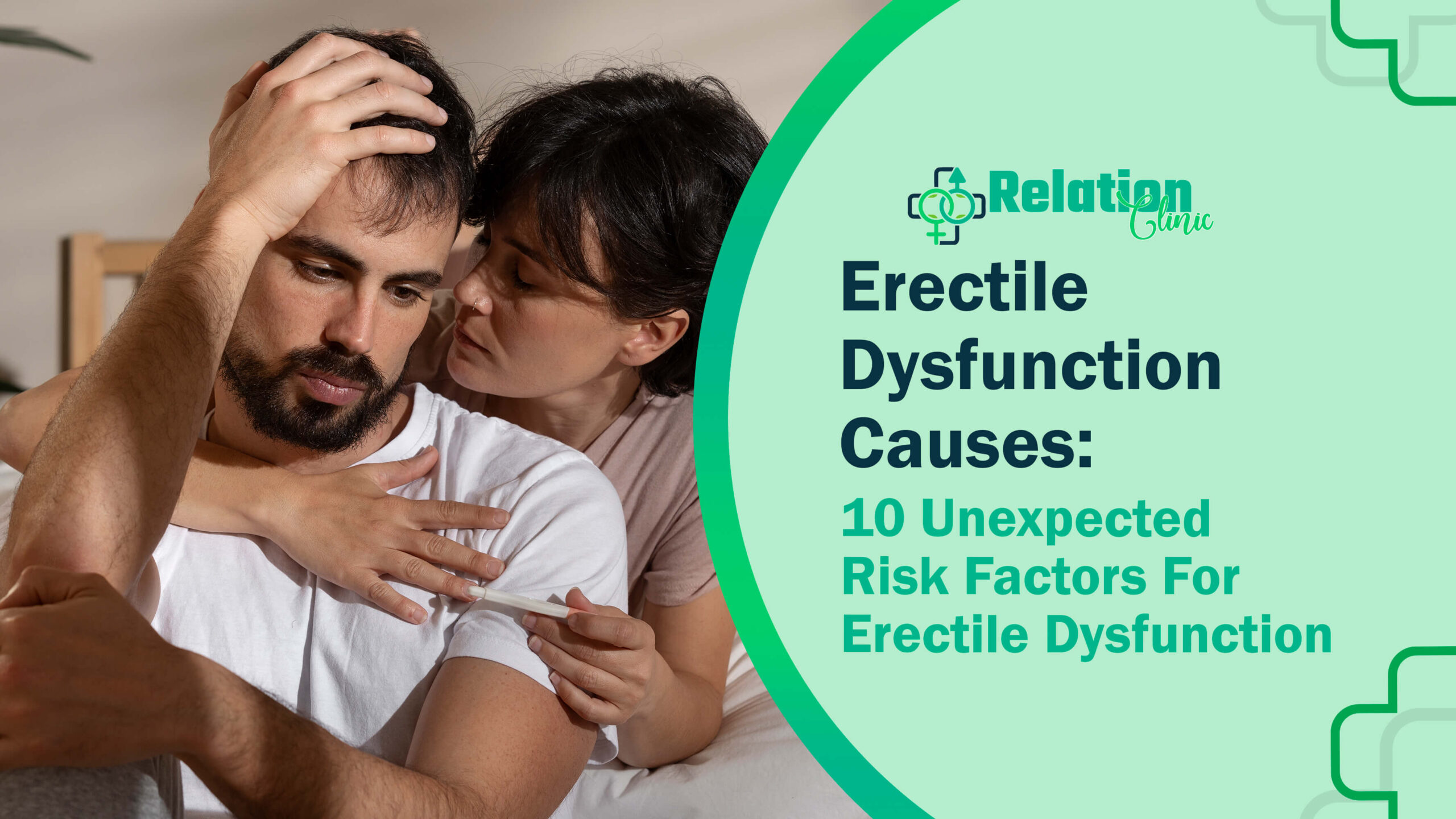INTRODUCTION
Experiencing occasional sexual off days is a common occurrence. However, what’s considered abnormal is an ongoing struggle to achieve and sustain an erection. This continuous challenge is referred to as erectile dysfunction, often abbreviated as ED.
Erectile dysfunction can have various underlying causes because the mechanism behind attaining an erection is a complex interplay of multiple factors and functions. While the well-known erectile dysfunction causes include age, chronic diseases, and lifestyle factors like smoking and obesity, several unexpected risk factors for erectile dysfunction can contribute to this condition. So, in this comprehensive guide, Relation Clinic will explore these lesser-known risk factors and shed light on the complex web of causes that can lead to ED. Understanding these unexpected causes of erectile dysfunction is essential for early detection, prevention, and effective management of this common sexual issue.
Surprising Risk Factors For Erectile Dysfunction(ED)

Erectile Dysfunction (ED), often referred to as impotence, is a condition that affects a significant number of men worldwide. So, our ayurvedic erectile dysfunction doctors have listed ten unexpected risk factors for erectile dysfunction below:
1. Psychological Stress:
One of the less-acknowledged risk factors for erectile dysfunction is psychological stress. High levels of stress can lead to anxiety, depression, or other mental health issues, all of which can negatively impact sexual function. Anxiety and stress trigger the release of cortisol, a hormone that can interfere with the production of nitric oxide, a key player in achieving and maintaining an erection. So, it’s essential to recognize and manage stress effectively to mitigate its effects on sexual health.
2. Sleep Disorders:
Sleep is vital for overall health, and disruptions in sleep patterns can have surprising consequences, including ED. Conditions like sleep apnea, characterized by interrupted breathing during sleep, can lead to reduced oxygen levels and increased sympathetic nervous system activity, both of which can contribute to ED. Treating underlying sleep disorders can significantly improve erectile function.
3. Medications:
Certain medications can cause or worsen ED as an unexpected side effect. These may include antidepressants, antipsychotics, hair loss medications, blood pressure medications, and even over-the-counter antihistamines. If you suspect that your medication is affecting your sexual function, consult your healthcare provider for potential alternatives or solutions.
4. Bicycle Riding:
While cycling is an excellent cardiovascular exercise, prolonged and intense bicycle riding can put pressure on the perineum, leading to nerve and vascular damage. This can result in temporary or permanent erectile dysfunction. Proper bicycle seat design and taking breaks during long rides can help mitigate this risk factor for erectile dysfunction.
5. Excessive Pornography Consumption:

The easy accessibility of graphic content on the internet has led to a rise in pornography consumption. While occasional use is harmless for most, excessive consumption may lead to a condition known as pornography-induced erectile dysfunction (PIED). PIED can make it challenging to achieve or maintain an erection during real-life sexual encounters. It is important to limit the consumption of explicit content as it can be an effective way to improve erectile function.
6. Low Testosterone Levels:
Testosterone is a hormone that plays a significant role in male sexual function. Surprisingly, low testosterone levels can be an unexpected risk factor for erectile dysfunction. Aging, chronic medical conditions, obesity, and some medications can contribute to decreased testosterone production, which can further contribute to the causes of ED. Addressing low testosterone through hormone replacement therapy or lifestyle changes may help improve male sexual function.
7. Chronic Gum Disease (Periodontitis):
Periodontitis, a severe form of gum disease, has been linked to an increased chance of ED. The inflammation and bacterial infection associated with gum disease can damage blood vessels and impair blood flow, which is a crucial factor in achieving and sustaining an erection. So, maintaining good oral hygiene and seeking treatment for gum disease can potentially reduce the risk of erectile dysfunction.
8. Physical Injury:
Trauma or injury to the pelvic area, spinal cord, or nerves controlling erections can result in ED. Such injuries can disrupt the complex process that leads to an erection. Depending on the extent of the injury, ED can be temporary or long-lasting. So, seeking prompt medical attention and exploring treatment options with a healthcare provider is essential in these cases.
9. Diabetes:
Diabetes, particularly uncontrolled or poorly managed diabetes, is a well-established risk factor for ED. High blood sugar levels can damage blood vessels and nerves over time, impairing blood flow to the genitals and affecting the body’s ability to respond to sexual stimuli. Therefore, it is essential to maintain proper glycemic control through lifestyle modifications, medication, and regular monitoring for managing diabetes-related ED.
10. Canned Foods:
The consumption of processed foods, including canned goods, has been linked to ED. These foods often contain high levels of sodium, artificial preservatives, and unhealthy fats, which can negatively affect cardiovascular health. Poor cardiovascular health is a significant risk factor for ED, as it impedes blood flow to the penis. So, opting for a balanced diet rich in fruits, vegetables, whole grains, and lean proteins can promote better overall health and decrease the chance of ED associated with processed foods.
The Final Thoughts
Now, you are aware that erectile dysfunction is a condition with numerous risk factors, some of which may not be immediately noticeable. While age and chronic diseases remain significant contributors, understanding and addressing unexpected risk factors for erectile dysfunction, like stress, sleep disorders, medications, and oral disease, can be instrumental in preventing and managing erectile dysfunction and premature ejaculation.
If you are also one of those men struggling with erectile dysfunction, you can consider seeking professional guidance from Relation Clinic. Our doctors will provide you with the best ayurvedic erectile dysfunction treatment in India that will surely help your body resist the causes of erectile dysfunction. Along with the erectile dysfunction medicine, we will recommend necessary lifestyle changes that are essential for restoring sexual health and overall well-being.
As you know, early intervention can lead to positive outcomes and improved quality of life. So, call us today at +91-9831072167or mail your concern to info@relationclinic.com. Speaking out with us will help you get the support and treatment options needed to counter erectile dysfunction.

